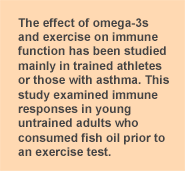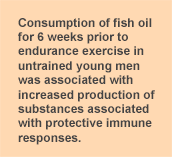
The health benefits of regular exercise have been abundantly described, but for some people that is just not enough. Regular exercise—just going for a daily walk—is something you have to work into your daily routine and consider essential. Once you do, a better feeling of wellbeing, improved circulation and breathing and sometimes a happier outlook usually follows. For older adults, regular exercise, which means a planned, structured and repetitive activity such as an aerobics class or brisk walking, improves muscle strength, balance and coordination. These benefits reduce the risk of falls and bone fractures, too.

Less well known is the association between regular moderate exercise and immune function. There is accumulating evidence that individuals who exercise regularly have reduced inflammation, a low-grade condition that underlies many chronic diseases, such as obesity, heart disease and type 2 diabetes. Physically fit, active individuals have a lower risk of respiratory tract and viral infections, an important consideration for older adults. Omega-3 fatty acids also reduce inflammatory responses and have been evaluated in athletes with asthma. Findings from these studies indicated that fish oil supplementation in competitive athletes with asthma was associated with improved lung function and less use of bronchodilators. But what happens in non-athletes, the rest of us? A recent study wanted to find out if taking fish oil or long-chain omega-3s affected selected immune responses after exercise in young, healthy individuals who were not trained athletes. In this study, the participating men consumed 1.6 g/day of EPA + DHA for 6 weeks prior to their exercise test. They had been given an exercise test upon entry to the study to determine the appropriate workload for the test. The investigators measured several markers of immune function 3 hours after performing the exercise on a stationary bicycle.

The researchers reported that the production of interleukin-2 and the number of natural killer cells increased in the men who pretreated with fish oil, but not in those given a placebo. Interleukin-2 is a signaling molecule that regulates the activities of white blood cells and responds to microbial infection. Along with other signaling molecules, it activates natural killer cells, which respond to viral infections and recognize stressed cells. These functions stimulate additional immune responses. The observed responses suggest that the consumption of fish oil enhanced protective immune responses after intense exercise. Whether these observations would have longer-term associations with susceptibility to infections was not examined in this short-term study. It would also be interesting to know whether similar responses would occur in older individuals who undertook endurance exercise. It has been reported that these immune responses are reduced in older adults, but the effect of exercise has not been explored.
 The health benefits of regular exercise have been abundantly described, but for some people that is just not enough. Regular exercise—just going for a daily walk—is something you have to work into your daily routine and consider essential. Once you do, a better feeling of wellbeing, improved circulation and breathing and sometimes a happier outlook usually follows. For older adults, regular exercise, which means a planned, structured and repetitive activity such as an aerobics class or brisk walking, improves muscle strength, balance and coordination. These benefits reduce the risk of falls and bone fractures, too.
The health benefits of regular exercise have been abundantly described, but for some people that is just not enough. Regular exercise—just going for a daily walk—is something you have to work into your daily routine and consider essential. Once you do, a better feeling of wellbeing, improved circulation and breathing and sometimes a happier outlook usually follows. For older adults, regular exercise, which means a planned, structured and repetitive activity such as an aerobics class or brisk walking, improves muscle strength, balance and coordination. These benefits reduce the risk of falls and bone fractures, too.  Less well known is the association between regular moderate exercise and immune function. There is accumulating evidence that individuals who exercise regularly have reduced inflammation, a low-grade condition that underlies many chronic diseases, such as obesity, heart disease and type 2 diabetes. Physically fit, active individuals have a lower risk of respiratory tract and viral infections, an important consideration for older adults. Omega-3 fatty acids also reduce inflammatory responses and have been evaluated in athletes with asthma. Findings from these studies indicated that fish oil supplementation in competitive athletes with asthma was associated with improved lung function and less use of bronchodilators. But what happens in non-athletes, the rest of us? A recent study wanted to find out if taking fish oil or long-chain omega-3s affected selected immune responses after exercise in young, healthy individuals who were not trained athletes. In this study, the participating men consumed 1.6 g/day of EPA + DHA for 6 weeks prior to their exercise test. They had been given an exercise test upon entry to the study to determine the appropriate workload for the test. The investigators measured several markers of immune function 3 hours after performing the exercise on a stationary bicycle.
Less well known is the association between regular moderate exercise and immune function. There is accumulating evidence that individuals who exercise regularly have reduced inflammation, a low-grade condition that underlies many chronic diseases, such as obesity, heart disease and type 2 diabetes. Physically fit, active individuals have a lower risk of respiratory tract and viral infections, an important consideration for older adults. Omega-3 fatty acids also reduce inflammatory responses and have been evaluated in athletes with asthma. Findings from these studies indicated that fish oil supplementation in competitive athletes with asthma was associated with improved lung function and less use of bronchodilators. But what happens in non-athletes, the rest of us? A recent study wanted to find out if taking fish oil or long-chain omega-3s affected selected immune responses after exercise in young, healthy individuals who were not trained athletes. In this study, the participating men consumed 1.6 g/day of EPA + DHA for 6 weeks prior to their exercise test. They had been given an exercise test upon entry to the study to determine the appropriate workload for the test. The investigators measured several markers of immune function 3 hours after performing the exercise on a stationary bicycle.  The researchers reported that the production of interleukin-2 and the number of natural killer cells increased in the men who pretreated with fish oil, but not in those given a placebo. Interleukin-2 is a signaling molecule that regulates the activities of white blood cells and responds to microbial infection. Along with other signaling molecules, it activates natural killer cells, which respond to viral infections and recognize stressed cells. These functions stimulate additional immune responses. The observed responses suggest that the consumption of fish oil enhanced protective immune responses after intense exercise. Whether these observations would have longer-term associations with susceptibility to infections was not examined in this short-term study. It would also be interesting to know whether similar responses would occur in older individuals who undertook endurance exercise. It has been reported that these immune responses are reduced in older adults, but the effect of exercise has not been explored.
The researchers reported that the production of interleukin-2 and the number of natural killer cells increased in the men who pretreated with fish oil, but not in those given a placebo. Interleukin-2 is a signaling molecule that regulates the activities of white blood cells and responds to microbial infection. Along with other signaling molecules, it activates natural killer cells, which respond to viral infections and recognize stressed cells. These functions stimulate additional immune responses. The observed responses suggest that the consumption of fish oil enhanced protective immune responses after intense exercise. Whether these observations would have longer-term associations with susceptibility to infections was not examined in this short-term study. It would also be interesting to know whether similar responses would occur in older individuals who undertook endurance exercise. It has been reported that these immune responses are reduced in older adults, but the effect of exercise has not been explored.

